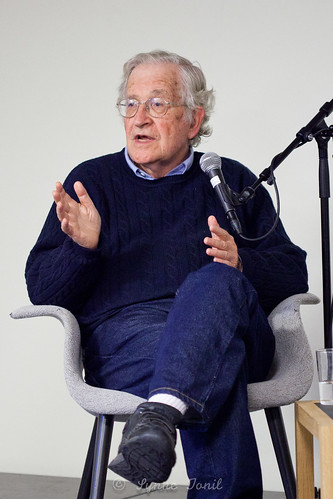Here’s Noam Chomsky on the enormously changed landscape on US campuses over the past twenty years surrounding the US/Israel-Palestine conflict. Among the issues discussed is the growing influence of Students for Justice in Palestine (SJP) groups and the petty isolation of pro-Israel groups on campuses.
The following is a raw excerpt from dialogues with prominent social critic and linguist, Noam Chomsky. The conversations were held in his office at the Massachusetts Institute of Technology, on 21 October 2011. Other excerpts from that interview were previously published by New Voices here.
Gabriel Schivone: Last weekend in New York City—the day before I saw you speak at Barnard College, in fact—Students for Justice in Palestine convened the first major national conference of its kind.
Noam Chomsky: Yeah. How’d it go?
It was amazing; the sheer level of college activism demonstrated by the registrants and participating groups alone was deeply inspiring. The wide degree of awareness and activity seemed to be beyond what anyone could have known or hardly imagined.
It’s one of the biggest issues on campus. You could see that at Barnard the other day when I spoke. If you go back a little before that, there would have been police protection from harassment and so on.
Between the fall 2010 and spring 2011 semesters alone, there were two mass mobilizations for national statements by SJP groups throughout the US that garnered between 50 and 60 group signatories. So, for conference attendance, I personally thought maybe there would be 70 participating groups, which I thought would be quite a stretch. But more than 100 chapters present and still many more that couldn’t attend directly? That’s the level of anti-apartheid college activism in the 1980s.

I’m not surprised. You could see it right there at Barnard. Hundreds of people turned away because the gym couldn’t hold them all. I don’t know if they told you, but the Hillel organization wanted to run a counter-conference, I think, the day before, but only a couple dozen people showed up.
The usual pathetic numbers, yeah.
And you could tell that in the Barnard audience, during the Q&A. There was a small group of kids off in one corner. And if you noticed, they were all reading prepared questions. These questions are prepared for them. It’s sort of like a catechism. And it happens all the time now. They read the question, a little group cheers—
And the whole place cheers at your answer, like what happened time and time again at that talk, I noticed, after each of them read their questions.
Yeah, they’re very isolated. But they used to dominate and just control everything. It wasn’t that long ago when they used to break up meetings. Even right here at MIT. Did you know Israel Shahak?
Uh-huh, yeah.
You knew him?
Well, I didn’t know him personally.
But you know who he was.
Yeah (laughs).
He came to MIT about 20 years ago and was staying with me. Among other things, he gave a talk here. Now, picture this guy: he’s a holocaust survivor; he was in the Warsaw Ghetto, Bergen-Belsen concentration camp. And he was one of the leading human rights activists in Israel, where he was very much respected. During his talk, the audience was flooded with right-wing, Zionist kids who were very carefully organized. And they essentially broke up the meeting. And he’s pretty tough, so he didn’t answer them back the way they were talking to him. But I remember at one point, some kid who looked sixteen years old, wearing a skullcap, got up with an audience and said, “How could you say those kinds of things about Israel when six million of us died in the Holocaust?” This little kid was talking to a guy who came out of the Warsaw Ghetto and Bergen-Belsen! I had a couple of friends there who were refugees from Europe, including my neighbor next door. They said they hadn’t seen anything like that since the Hitler Youth. And that was just twenty years ago. And, in fact, when I’d talk even at MIT, the police would insist on walking me back to my car, just because of the threats they were getting. But now, as you say, they’re just a tiny, isolated group. That’s an enormous change.
Gabriel Matthew Schivone is a Chicano-Jewish American from Tucson, AZ, and an organizer on the ad hoc steering committee of Students for Justice in Palestine National Conference 2011. He was a passenger aboard the Gaza Freedom Flotilla 2. E-mail: gschivone@asu.edu. Twitter: @GSchivone. His column, Other Voices, appears here on alternating Mondays.
